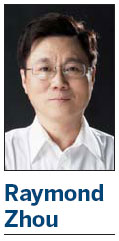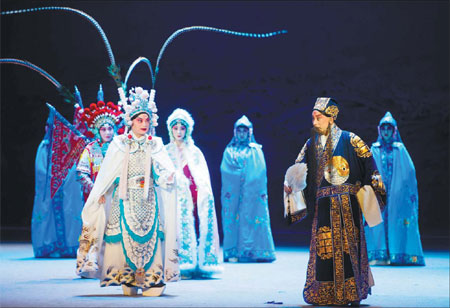In with the old and in with the new
Updated: 2013-06-21 09:03
(China Daily)
|
|||||||||||
|
The Peking Opera Red Cliff, produced by the National Center for the Performing Arts, is staged at Hungary's State Theater in Budapest in July 2012. Luo Xiaoguang / Xinhua |

While a recent documentary on Peking Opera has come under fire from critics and purists, it could be a step toward bringing a new audience to the ancient art form
An eight-episode documentary about the best-known of Chinese performing arts recently completed its premiere run on TV. Peking Opera is lavish and the narration brimming with purple prose. As soon as it went on air, it received plenty of attention and perhaps an equal amount of scrutiny.
A few minor factual errors were discovered, which the producers humbly acknowledged and said they would correct for repeat broadcasts. It was obvious the writer was not an insider of the profession, but used the curiosity of the first-timer to approach an art form as storied and as delicate as Peking Opera. A couple of slips in the voiceover text could be a small price to pay for attracting a potential audience whose knowledge of the art form remains limited to the television highlights of the old chestnuts, so to speak, such as Farewell My Concubine and The Intoxicated Lady.
Ditto for the profusion of re-enactment, which was also criticized by documentary purists. They accused the producers of making essentially a non-documentary where valuable interviews are condensed to snippets and soundbites, while demonstrations of performances are so elaborately staged as to qualify as scripted entertainment.
This kind of treatment, in my opinion, is designed for the non-converted rather than those already immersed in the history of Peking Opera. Just like other traditional forms of Chinese opera, Peking Opera is in dire need of cultivating a young audience. Widely considered the "national opera" of the country - not just because it was born in Anhui province and later flourished in the ancient city it's now named after - Peking Opera has a rapidly ageing demographic among its most loyal supporters and it needs to change that.
There are several theaters playing Peking Opera in the capital city, and many of these cater to the tourist crowd. No, it's not like Broadway. It's exclusively foreign tourists, whose curiosity must be satisfied after they have climbed the Great Wall and trekked through the Forbidden City. The programs invariably comprise visually stimulating shows like the Monkey King tales, which are more acrobatic than vocal. The compilation of highlights is tantamount to a tray of appetizers that tantalize more than fill you up. There is little need to graduate to the main entre, which runs the risk of gluttony for someone who just tasted it for the first time.
You cannot blame the presenters or the audience. Peking Opera is an acquired taste. It takes years to decipher the secret codes of appreciation. For one, the lyrics and dialogue tend to be impenetrable without title projection - that is for us native Chinese. And the emotions and motivations of the characters do not speak to modern audiences as much as, say, highly accessible pop music.
There was an effort to modernize the art form in the 1960s and 1970s. That repertory, called the "model operas", is in equal measure a source of nostalgia, and a reminder of pain and shame. They were not created by artists who worked under ideal conditions, to say the least, but rather, in abnormal situations where one wrong idea could land you in jail. But the end products fed a hungry nation devoid of any entertainment. In purely artistic terms, these ideology-driven operas were unqualified successes. For example, Western musical instruments were seamlessly incorporated to expand the range of expressiveness. Of course, you can argue that during those years nobody dared to offer a second opinion, and a tune repeated a thousand times would no doubt turn into a classic. But it could also be true that if you round up the nation's top artists and threaten them with all forms of terror, what they created wouldn't be too shabby.
Even if the tunes from the model operas are endlessly hummable, at least to one whole generation, I don't consider it a good precedent in reviving the glory of Peking Opera. If I have to choose between the hoary repertory of palace drama and the vitality of revolutionary operas, I would rather stick with the former. The latter is an anomaly of the times.
Traditional operas are stagnant partly because they are cut off from modern necessities and sensibilities. In the old days, people tended to rely on them for a regular diet of history lessons; nowadays that mantle is picked up by television serial dramas. Another shift in taste is, people used to prefer drama sung than spoken, and now the young generation may like plays and music, but often squirm when seeing the two forms fused. That may explain the lack of popularity in China of the musical genre.
Good-intentioned but misguided efforts to popularize Peking Opera include the initiative to make a dozen arias suggested listening material for high-school students. That may serve to break down the mystique enshrouding the art form, but it is unlikely to convert many of them into true lovers. Exposure is certainly not the biggest hurdle. There are special television channels devoted to traditional opera that any one who cares to can tune into to get their fix.
It is the "easing into it" that will help youngsters with the learning and appreciation process. And that's where the documentary may be an effective aid. It demystifies the art form while at the same time placing it under a thick halo.
To a certain extent, Western classical music, including opera, is in a similar dilemma. But it has its share of stars who can help sell out shows and entice new audiences. Peking Opera needs its equivalent of Leonard Bernstein, whose televised lectures and demonstrations spawned a whole generation of classical music aficionados. As it stands, Peking Opera does not have a star big enough to cross over to the general public. All we have is a few pop singers who occasionally foray into the Peking Opera realm and snatch a few elements, such as melodies and makeup, to spruce up their tradition-embracing credentials.
Which is better than nothing. It hints to young people that Peking Opera can be chic and that it's not just for their parents and grandparents. But sometimes this kind of practice is carried too far, for example, when a group of scantily clad girls don Peking Opera headgear in a set of photos for a modeling contest.
To find a true audience of the younger demographic, Peking Opera has got to innovate in both form and content. Given Chinese loathing for tinkering with tradition, it would be unwise to "update" the old repertory to new versions. Keep them as they have always been. Sing and dance exactly as Mei Lanfang, the great master, did on stage. But create new shows that expand its musical idiom and narrative scope.
A few years ago, Chinese-American director Chen Shizheng staged a new version of Farewell, My Concubine in Beijing, incorporating a multimedia backdrop and modern dance, among other new elements. The production was lambasted in the press. But Red Cliff, the Three Kingdom legend produced by the National Center for the Performing Arts, was met with universal acclaim. It's both old and new. The story, the tunes and the costumes follow the old conventions, but the presentation and even some of the messages are new. There is an anti-war theme in the grand finale. Now, that is something the modern audience can resonate with.
Contact the writer at
raymondzhou@chinadaily.com.cn
(China Daily European Weekly 06/21/2013 page30)
Today's Top News
List of approved GM food clarified
ID checks for express deliveries in Guangdong
Govt to expand elderly care
University asks freshmen to sign suicide disclaimer
Tibet gears up for new climbing season
Media asked to promote Sino-Indian ties
Shots fired at Washington Navy Yard
Minimum growth rate set at 7%
Hot Topics
Lunar probe , China growth forecasts, Emission rules get tougher, China seen through 'colored lens', International board,
Editor's Picks

|

|

|

|

|

|






